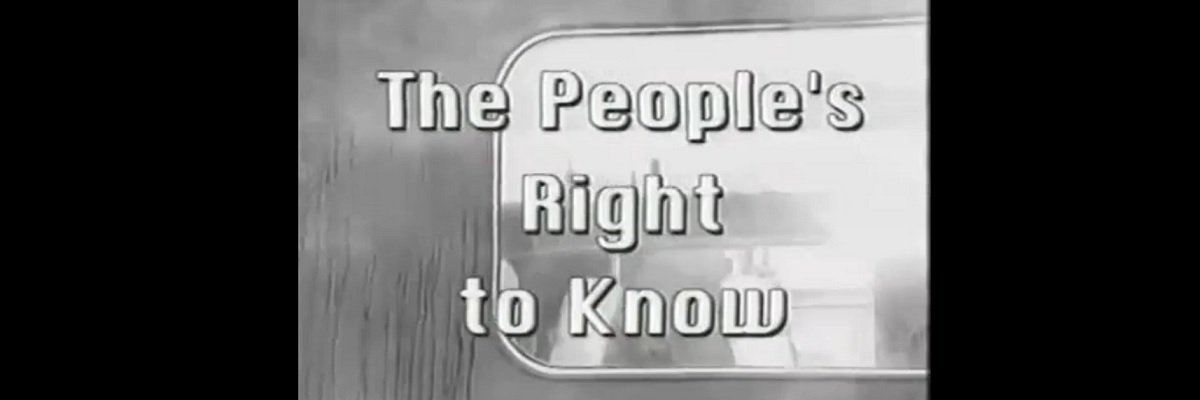Michael Powell is a cultural anthropologist with a Ph.D from Rice University. His research has focused on the cultural impact of government redaction in released documents. He has also studied Freedom of Information laws worldwide, including in the U.S. and Poland. For this week’s Requester’s Voice, Michael discussed the troubling and weird tone of a Pentagon FOIA training video he got his hands on a few years ago, as well as his past research on government transparency.
Why did you request the Pentagon’s FOIA training video?
I was in Houston doing government transparency research in graduate school and was interested in how FOIA officers were trained. I didn’t get the video for two years. One day I saw an odd package in my mailbox and had forgotten all about this tape. The real irony is the video is called The People’s Right To Know yet they didn’t want me to know about the video.
What was your reaction to the video?
I thought it was crazy. Education is really critical to understanding culture. How people learn to be a FOIA officer, or even for how we learn to be a FOIA requester is critical. The more we can understand about the training, the better. I liken it to looking at the stars in the sky. Regular people think that stars are very beautiful, but if you are an astronomer you can begin to pick things out in the sky and recognize patterns.
That’s why it’s important to look at something like a training video to understand how you learn to be a FOIA officer. There is a lot of basic information in the training video but that information is already out there in FOIA training manuals. So why frame it in this strange romantic way? All the style around it gives you the sense someone was thinking, “this is going to be entertaining and fun and people will learn better.” But the choices in the video and the cultural touch points are very meaningful. They have an influence on how we think.
The FOIA process should be very professionalized and stress transparency instead of romanticizing secrecy. It romanticizes who’s in the know and who isn’t. In general, it’s such a strange video, and creates more paranoia around this type of information.
Could you talk about about the culture around redaction in government agencies?
On a conceptual level, it does seem very often the case that when people see all of these black marker redactions there is a negative response. It creates a lot of paranoia. There’s so much about FOIA that the public doesn’t know or understand. They wonder about blackouts, and don’t see how redactions can be a good thing in a way. If you didn’t black out, we wouldn’t get any information at all or be aware the document existed. Most people don’t get that, they just see it as more government secrecy.
The other side of the coin is for every partially redacted government document, I don’t even think we know how many documents the government is saying we can’t even look at — redacted or not. The well is very deep.
Do you think citizens have to rely on leakers like Edward Snowden or WikiLeaks to get meaningful information, or do you still see a valuable role for FOIA?
I think there is still value for FOIA. I am optimistic about FOIA and what it can do, it’s a great tool. We would be worse off if it didn’t exist, I think that’s very clear. I hope it is.
The issue of WikiLeaks is interesting because I feel like its different than the Snowden leaks. The weird thing about WikiLeaks is they wage a war on secrecy in general. And that, I think, is problematic because it lacks focus. The Snowden leaks were a lot more focused. It wasn’t about a war on secrecy; it was a war on very specific policies from an employee at the NSA. Snowden was focused on what the NSA was doing.
This battle to get rid of all government secrecy, that’s utopian and not possible. There is going to be government secrecy and the more that we agree that’s a given fact, the better off we are. We can then look at how the system works, and offer improvements.
You’ve done anthropological work comparing transparency laws in the US and Poland. What did you learn in your studies?
I spent a year in Warsaw, and my Ph.D dissertation focused on transparency in Poland. I was also researching how people use FOIA in America and it was interesting because I very quickly realized that nobody was using the transparency law in Poland.
The law was fairly new, they called it the “law about access to public information,” because they rejected the term “freedom of information.” They told me they had a legislative rule where they couldn’t name a law in an inaccurate way. They thought “freedom” was an inaccurate term they weren’t actually freeing information.
I quickly found that nobody was using the law and there were a few reasons why. One was that the population wasn’t really aware of what it was. Another was that people distrusted the government and didn’t believe bureaucrats would actually give them accurate information because there is a long legacy of corruption and distrust in the communist government in Poland.
The last point is that in Poland you didn’t request information through this law, you would instead ask the government a question. They framed it in this way where it was very unclear of how the government would respond to a question and how long it would take to respond. It also wasn’t clear how much depth would be contained in the answer.
In your studies of Poland’s weaker system, did you gain a greater appreciation for American transparency laws?
Yes, in some respects FOIA is a great tool because you can go after specific documents. It also made me more aware of the problem of trying to figure out what documents exists in the first place. That seems to be a major deficiency of FOIA. It’s as if there is a library that exists but we aren’t allowed to wander around, or for that matter see the catalogue. We are requesting books but we don’t know what the catalogue looks like. One of the places to innovate on FOIA would be to get the public a better sense of how many, and what kind of records are out there.
Do you have any other suggestions for improving the FOIA process?
You almost wish there were supplemental options to FOIA that would help us get information by other means. Obviously only journalists get to go to press conferences and needle government officials with questions. It seems like a lot of people want to do that. I would never say lets get rid of FOIA and do that instead, but other avenues would be helpful.
A lot of very savvy requesters know how to get good information from a request. They know how to read between the lines. Unfortunately, if you are new to FOIA, it’s hard to be precise enough. It’s just such a vast process, there’s almost something artistic or performative to FOIA. You write a request, and it’s like writing a musical score. You are writing instructions for someone else to complete. It’s like Google search, except someone else looks through the records for each search. It’s so archaic.




